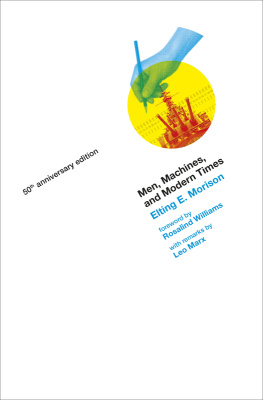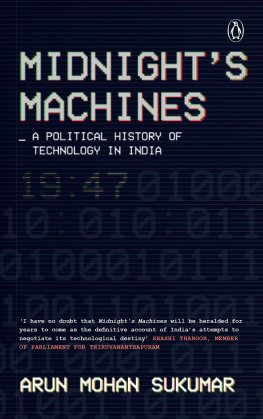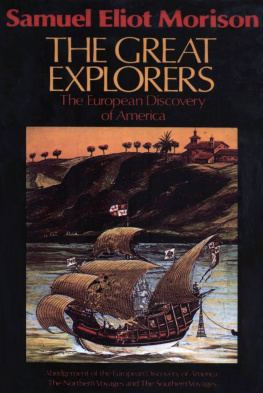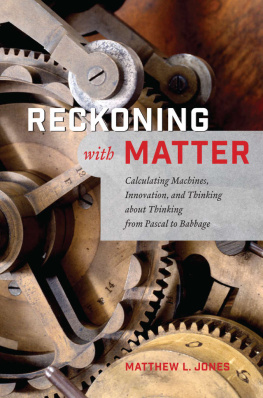Elting E. Morison - Men, Machines, and Modern Times
Here you can read online Elting E. Morison - Men, Machines, and Modern Times full text of the book (entire story) in english for free. Download pdf and epub, get meaning, cover and reviews about this ebook. year: 2016, publisher: MIT Press, genre: Romance novel. Description of the work, (preface) as well as reviews are available. Best literature library LitArk.com created for fans of good reading and offers a wide selection of genres:
Romance novel
Science fiction
Adventure
Detective
Science
History
Home and family
Prose
Art
Politics
Computer
Non-fiction
Religion
Business
Children
Humor
Choose a favorite category and find really read worthwhile books. Enjoy immersion in the world of imagination, feel the emotions of the characters or learn something new for yourself, make an fascinating discovery.
- Book:Men, Machines, and Modern Times
- Author:
- Publisher:MIT Press
- Genre:
- Year:2016
- Rating:5 / 5
- Favourites:Add to favourites
- Your mark:
- 100
- 1
- 2
- 3
- 4
- 5
Men, Machines, and Modern Times: summary, description and annotation
We offer to read an annotation, description, summary or preface (depends on what the author of the book "Men, Machines, and Modern Times" wrote himself). If you haven't found the necessary information about the book — write in the comments, we will try to find it.
Men, Machines, and Modern Times — read online for free the complete book (whole text) full work
Below is the text of the book, divided by pages. System saving the place of the last page read, allows you to conveniently read the book "Men, Machines, and Modern Times" online for free, without having to search again every time where you left off. Put a bookmark, and you can go to the page where you finished reading at any time.
Font size:
Interval:
Bookmark:
50th anniversary edition
Elting E. Morison
foreword by
Rosalind Williams
with remarks by
Leo Marx
The MIT Press
Cambridge, Massachusetts
London, England
2016 Massachusetts Institute of Technology
Originally published in 1966 by the MIT Press. Reprinted with corrections.
All rights reserved. No part of this book may be reproduced in any form by any electronic or mechanical means (including photocopying, recording, or information storage and retrieval) without permission in writing from the publisher.
This book was set in Helvetica Neue LT Pro and Century Schoolbook Pro by Toppan Best-set Premedia Limited. Printed and bound in the United States of America.
Library of Congress Cataloging-in-Publication Data
Names: Morison, Elting Elmore, author.
Title: Men, machines, and modern times / Elting E. Morison; foreword by Rosalind Williams; with remarks by Leo Marx.
Description: 50th anniversary edition. | Cambridge, MA : The MIT Press, 2016. | Includes index.
Identifiers: LCCN 2016001863 | ISBN 9780262529310 (pbk. : alk. paper)
eISBN 9780262336574
Subjects: LCSH: TechnologyPhilosophy. | Inventions. | Technological innovations.
Classification: LCC T14 .M59 2016 | DDC 303.48/3dc23 LC record available at http://lccn.loc.gov/2016001863
ePub Version 1.0
To the other members
Rosalind Williams
Trigger warning: Men, Machines, and Modern Times may be offensive to a 2016 reader who takes for granted the vast broadening, over the past half century, of actors and experiences deemed to be historically significant. The author, Elting Morison, played no role in that broadening. In his historical world, subalterns, non-whites, and women are almost entirely absent. Instead, it is dominated by white men working in American business or military organizations.
From the first pages, Morison takes his place in this privileged world. He recalls how in his senior year in college he had gone off to my familys house in the country to complete the writing of my senior thesis (1). The college was Harvard, though he feels no need to tell us this. He does tell us that the house, built by a great-uncle, was full of stuff related to his profession as a civil engineer. This stuff included a volume the great-uncle had written in the 1890sa series of papers bound together under the title A New Epoch. As the young man started leafing through the papers, he discovered the startling thesis of this volume. His uncle had proposed that humankinds unprecedented ability to manufacture power would usher in an era of destruction. There must be a great destruction, both in the physical and in the intellectual world, of old buildings and old boundaries and old monuments and, furthermore, of customs and ideas, systems of thought and methods of education (17). The world would be better off if it could avoid this new epoch of war, insurrection and other trials (18), but no escape from the apocalypse seemed likely.
Here, from the first chapter of Men, Machines, and Modern Times, is the tension at its heart: the voice of an author comfortably embedded in a civilization of technological prowess, and his message that this civilization is doomed. Morisons book is a prophecy of the future that is also a critique of the present. Both prophecy and critique are all the more powerful because they come not from the oppressed other but from the core of the power structure producing this world.
Despite the title, Morisons topic in this book is not machines but innovation: not the production of material things, but the hyper-production of change that is the cause of the coming era of destruction. The oft-cited essay Gunfire at Sea is aptly subtitled A Case Study of Innovation. In this and the other essays in this volume, Morison keeps returning to the conflict between innovation and conservation. He values technical innovation for satisfying human needs and desires. He also values conservation of human social structures, which are routinely destroyed by technical innovations.
In weighing the relative merits of innovation and conservation, Morison keeps shifting his assessment, never resolving his ambivalence. So, for example, Gunfire at Seafirst presented as lectures at the California Institute of Technology in 1950is a narrative of heroism, in which a brave, enlightened junior naval officer, William S. Sims, locks horns with reluctant senior officers and bureaucrats protecting the old, ineffective way of sighting guns on naval vessels. Finally, an appeal to an authority outside the systemPresident Theodore Rooseveltunexpectedly and happily carries the day for Sims, and for Enlightenment.
When Morison gave a similar series of lectures at Cal Tech thirteen years later, in 1963, he presented another case study in innovation, this one involving a radically new design for a sail-and-steamship hybrid vessel eventually named the Wampanoag. Morison explains that he intended to repeat the point of Gunfire at Seathe stupidity of culture-bound resistance to changebut the more he looked at this case, the more he appreciated the logic of resistance: What these [resistant] officers were saying was that the Wampanoag was a destructive energy in their society (157158). Once they realized that the force of its engines was stronger than the weight of their way of life, they had a sudden insight into the nature of machinery. They perceived that a machine, any machine, if left to itself, tends to establish its own conditions, to create its own environment and draw men into it (158). The warship was a harbinger of a whole system of technical invention that has created a whole new kind of world for us (158). To put it another way, this system of innovation would bring the end of the world as they knew it.
In the world of 2016, it is taken for granted that innovation is a Good Thing. If you read Men, Machines, and Modern Times through this twenty-first-century lens, you might take it as a how-to guide in overcoming benighted resistance to change. This is the reading of politician Newt Gingrich in his 2002 online review on the books Amazon sales page. Gingrich lauds it as purely and simply one of the best books ever written on the process of innovation and of technology, culture, systems, and individual personalities. Anyone interested in the process of transformation or the development of technological change should read it, Gingrich writes, especially those dealing with military or health systems.
But improving technological systems is not Morisons goal. Instead, he warns of a basic incompatibility between technical innovation and social stability. His concern about this incompatibility grows stronger between the beginning and the end of Men, Machines, and Modern Times. In Gunfire at Sea, the opening essay, Morison recommends an adaptive society (25) in which humans adapt to their own technological changes. By the last essay, titled Some Proposals, he recommends an experimental society (293) that will collectively weigh and sort through innovations, accepting some and rejecting others: Means must be discovered for society to keep charge over its own nature and direction (288). The experimental society of Some Proposals does not necessarily adapt to its technological means, but finds other means to control its ends. However, the proposals Morison suggests for doing this are awkward and at times illogical. While challenging the assumption that innovation is a Good Thing, he is unable to find ways to direct it wisely from within an innovation-centric society.
But then who has solved this puzzle? Morison is not at his best when he takes on the guise of a social scientist. He is at his best as a humanist, which makes sense for someone who began his scholarly career teaching literature at MIT. The rest of his career, it might be said, is one long struggle to find language adequate to his historical insight.
Font size:
Interval:
Bookmark:
Similar books «Men, Machines, and Modern Times»
Look at similar books to Men, Machines, and Modern Times. We have selected literature similar in name and meaning in the hope of providing readers with more options to find new, interesting, not yet read works.
Discussion, reviews of the book Men, Machines, and Modern Times and just readers' own opinions. Leave your comments, write what you think about the work, its meaning or the main characters. Specify what exactly you liked and what you didn't like, and why you think so.











